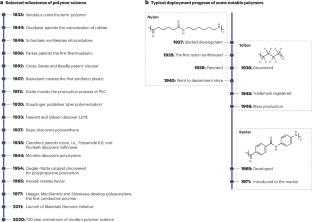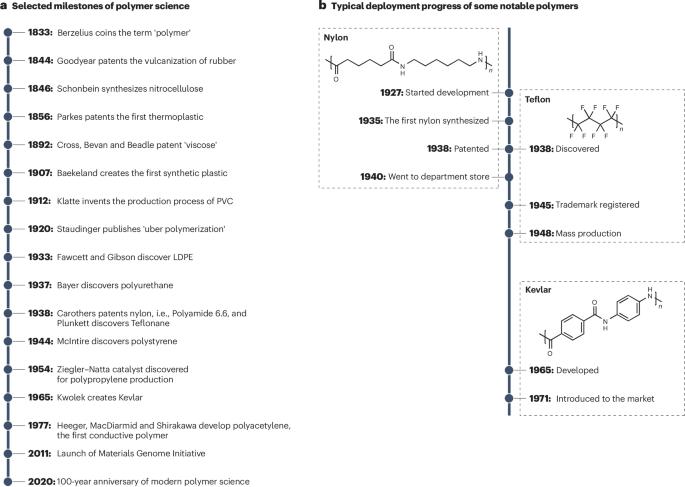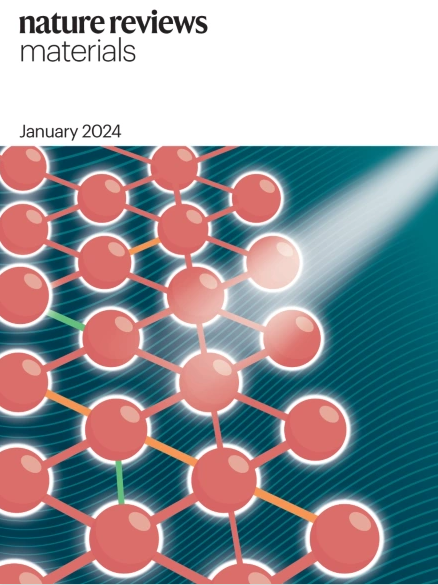人工智能辅助设计功能性和可持续聚合物
IF 79.8
1区 材料科学
Q1 MATERIALS SCIENCE, MULTIDISCIPLINARY
引用次数: 0
摘要
基于人工智能(AI)的方法在加速材料设计和开发方面不断取得进展。在此,我们回顾了人工智能在聚合物信息学子领域取得的进展,尤其关注特定应用的实用聚合物材料的设计。我们考虑了在一些关键和新兴应用领域中的示范性设计尝试,包括用于储存、生产和节约能源的材料设计,以及可为我们实现由可回收和/或可生物降解聚合物驱动的可持续经济做好准备的材料设计。人工智能驱动的工作流程有助于高效搜索材料的巨大化学和构型空间,利用现代机器学习(ML)算法解决 "正向 "和 "反向 "材料设计问题。本综述探讨的一个主题是基于信息学的实用设计规程,包括创建一套特定应用的目标特性标准,为这些相关的目标特性建立 ML 模型预测器,列举或生成可行聚合物的有形群体,并选择符合设计建议的候选材料。我们针对几种与能源和可持续发展相关的应用演示了该方案。最后,我们展望了在工业规模材料开发中广泛采用信息学驱动协议所必须克服的障碍。本文章由计算机程序翻译,如有差异,请以英文原文为准。


Design of functional and sustainable polymers assisted by artificial intelligence
Artificial intelligence (AI)-based methods continue to make inroads into accelerated materials design and development. Here, we review AI-enabled advances made in the subfield of polymer informatics, with a particular focus on the design of application-specific practical polymeric materials. We consider exemplar design attempts within a few critical and emerging application spaces, including materials designs for storing, producing and conserving energy, and those that can prepare us for a sustainable economy powered by recyclable and/or biodegradable polymers. AI-powered workflows help to efficiently search the staggeringly large chemical and configurational space of materials, using modern machine-learning (ML) algorithms to solve ‘forward’ and ‘inverse’ materials design problems. A theme explored throughout this Review is a practical informatics-based design protocol that involves creating a set of application-specific target property criteria, building ML model predictors for those relevant target properties, enumerating or generating a tangible population of viable polymers, and selecting candidates that meet design recommendations. The protocol is demonstrated for several energy- and sustainability-related applications. Finally, we offer our outlook on the lingering obstacles that must be overcome to achieve widespread adoption of informatics-driven protocols in industrial-scale materials development. Artificial intelligence (AI)-based methods continue to make inroads into accelerated materials design and development. This Review focuses on AI-enabled advances in polymer informatics, highlighting practical design protocols and exemplar applications in energy and sustainability, while also addressing challenges to industrial adoption.
求助全文
通过发布文献求助,成功后即可免费获取论文全文。
去求助
来源期刊

Nature Reviews Materials
Materials Science-Biomaterials
CiteScore
119.40
自引率
0.40%
发文量
107
期刊介绍:
Nature Reviews Materials is an online-only journal that is published weekly. It covers a wide range of scientific disciplines within materials science. The journal includes Reviews, Perspectives, and Comments.
Nature Reviews Materials focuses on various aspects of materials science, including the making, measuring, modelling, and manufacturing of materials. It examines the entire process of materials science, from laboratory discovery to the development of functional devices.
 求助内容:
求助内容: 应助结果提醒方式:
应助结果提醒方式:


